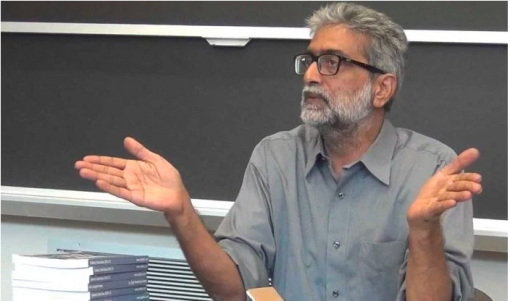
As an associate professor in political science at Drew University, New Jersey, who teaches and researches on human rights in India and the United States, I have been shocked to hear about the arbitrary arrest of prominent human rights activist and journalist Gautam Navlakha (as well as PUCL lawyer/ activist Sudha Bhardwaj, eminent poet Varavara Rao, lawyer Arun Ferreira and others) under the draconian Unlawful Activities Prevention Act that undermines basic due process rights.
For researchers of democracy and human rights, the meticulous work done by human rights defenders like Navlakha (and Bhardwaj) has been a crucial source for understanding violations of human rights and how those violations are being addressed by the Indian state. As Justice D.Y. Chandrachud of the Indian Supreme Court recently said in relation to the arrests of these activists: “Dissent is the safety valve of democracy and if you don’t allow these safety valves, it will burst.”
It is indeed worrying to hear that eminent human rights activists who have spent their entire lives in the service of protecting and promoting the rights of the marginalised are now being targeted themselves. As the United Nations Declaration on Human Rights Defenders puts it: States are obliged to “take all necessary measures to ensure the protection of everyone against any violence, threats, retaliation, adverse discrimination, pressure or any other arbitrary action as a consequence of his or her legitimate exercise of the rights referred to in the Declaration.”
To recall the role that Gautam Navlakha, a member of the Peoples Union for Democratic Rights for many decades, has played in the Indian and global discourse of rights is to record an attempt to defend the founding values enshrined in the Indian Constitution – those of equality and liberty that the civil liberty and democratic rights movement in India has been committed to protecting since the 1980s.
All of Navlakha’s work, whether as a critic of the extraordinary laws such as POTA and TADA, or AFSPA, or as a commentator on the causes of militancy in Kashmir and northeastern and central India are reflective of his commitment to understanding the fissures in Indian democracy as an attempt to fulfill the promise of democracy and equality for all.
After all, the extraordinary laws he has written about have been widely criticised for their arbitrariness and the sections of society they target, such that even the Indian Supreme Court has had to step in routinely to address excesses under these laws, as indicated in the ongoing case on extrajudicial killings in Manipur. National bodies such as the National Human Rights Commission and UN bodies such as the Universal Periodic Review have also recognised the human rights violations under these laws.
One could in fact say it is human rights defenders such as Navlakha who have so systematically contributed towards a body of knowledge that forces one to examine the presence of these laws in a democracy and whether the laws really address the underlying reasons of discontent and inequality in Indian society.
Navlakha is renowned both as a human rights defender and as a meticulous journalist. His articles in the Economic and Political Weekly and elsewhere are extremely well researched and historically situated, their insightfulness due to his deep and committed understanding of Indian state and politics. EPW is one of the foremost journals on South Asia that is read globally and is a marker of whether one’s academic research has policy and practical implications. Navlakha as one of the journal's consulting editors has both shaped its remarkable journey and routinely contributed to its high quality.
If such exemplary work is not valued, but rather such a person is arbitrarily targeted for precisely the work Navlakha is involved in, it is a shocking signal being sent to those who are watching Indian democracy. Just at a time when the Indian Supreme Court has upheld the right to dignity, freedom and equality in decriminalising homosexuality and earning the respect of democracy activists around the globe, the world waits to see whether a similar maturity of constitutional morality is reflected in how these activists’ rights are considered.
I interviewed Gautam Navlakha in 2014 for an academic project on human rights and torture, and his insights reflected the incredible decades of work that PUDR has done on the subject through fact finding reports, and Navlakha's own writings.
But above all his words emerged from a very basic quest to realise the essence of liberty and dignity, and what that would require from Indian polity and society.
Today, one can only reiterate the necessity for such a human rights defender to be free to speak, think, write and dissent without being arbitrarily and unfairly targeted.




